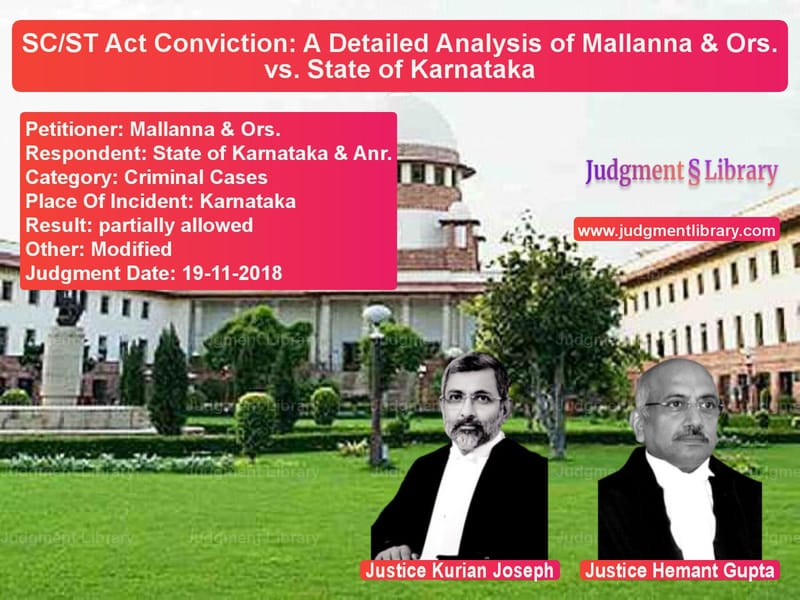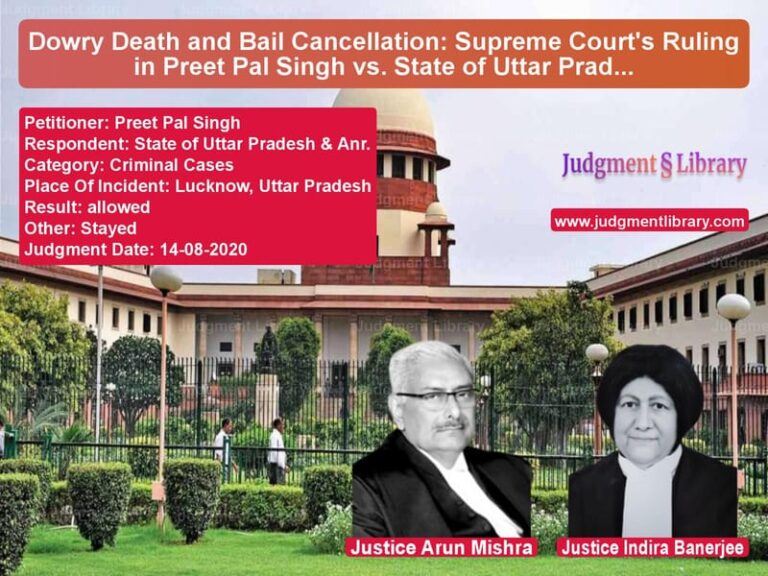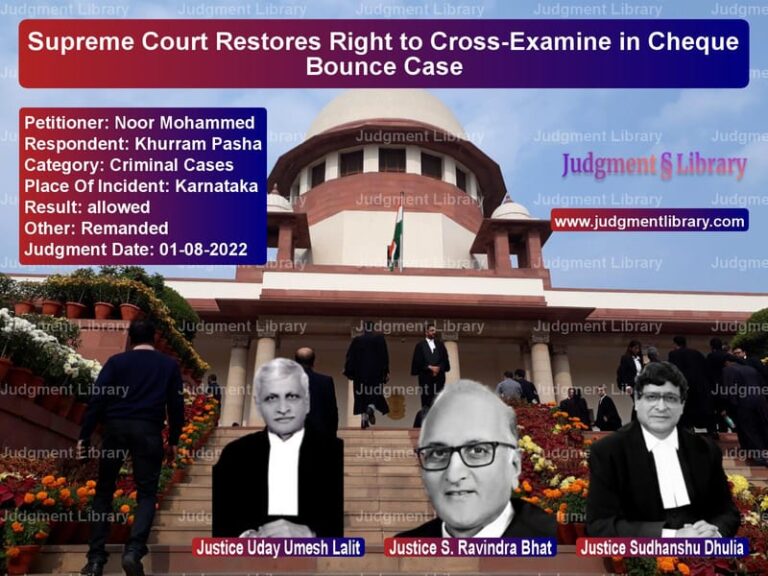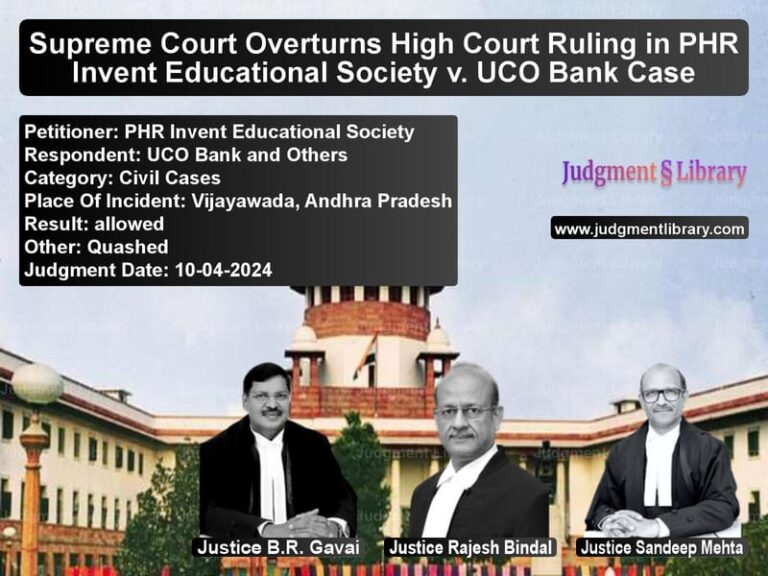SC/ST Act Conviction: A Detailed Analysis of Mallanna & Ors. vs. State of Karnataka
The case of Mallanna & Ors. vs. The State of Karnataka is a landmark judgment dealing with the Scheduled Castes and Scheduled Tribes (Prevention of Atrocities) Act, 1989 (SC/ST Act) and its interplay with the Indian Penal Code (IPC). The Supreme Court delivered this judgment on November 19, 2018, carefully analyzing the prosecution’s evidence, legal provisions, and precedents before rendering its decision.
This case raises significant legal questions regarding the application of the SC/ST Act, the evidentiary burden required for a conviction, and the principles governing appellate review. It provides crucial insights into how the judiciary interprets laws meant to protect marginalized communities while ensuring fair trial rights for the accused.
Background of the Case
The prosecution alleged that the accused, Mallanna and others, committed offenses under the SC/ST Act and various sections of the IPC. The complainant, a member of the Scheduled Caste community, alleged that the accused engaged in acts of violence and intimidation against him due to his caste identity. The trial court found the accused guilty and sentenced them under relevant provisions of the SC/ST Act and IPC.
The accused appealed against the conviction, challenging the findings of the trial court and the High Court. They contended that the evidence presented was insufficient, and their fundamental rights to a fair trial had been violated. The case reached the Supreme Court, which undertook a detailed review of the evidence and legal arguments.
Arguments Presented
Petitioner’s Arguments
- The petitioners argued that there was a lack of credible evidence to prove that the alleged offense was committed due to caste-based discrimination.
- They contended that the complainant’s testimony was inconsistent and unreliable.
- The petitioners highlighted that independent witnesses had not corroborated the prosecution’s version.
- They also claimed that the prosecution had failed to prove that the accused had knowledge of the complainant’s caste.
Respondent’s Arguments
- The prosecution argued that the complainant’s testimony was clear and consistent and should be considered reliable.
- It was contended that the accused had indeed committed the offense with full knowledge of the victim’s caste identity.
- The state emphasized that the SC/ST Act was enacted to protect marginalized communities from atrocities and that courts should interpret it in a manner that upholds the legislative intent.
Key Observations of the Supreme Court
The Supreme Court examined the lower courts’ findings and analyzed the legal principles governing cases under the SC/ST Act. The Court noted the following:
- For a conviction under the SC/ST Act, it is necessary to prove that the offense was committed on account of the victim’s caste and not merely due to personal enmity.
- The complainant’s testimony was consistent but lacked corroboration from independent witnesses.
- The prosecution had failed to establish beyond a reasonable doubt that the accused had knowledge of the complainant’s caste at the time of the offense.
- The Court reiterated the principle that mere allegations under the SC/ST Act cannot result in automatic conviction; the burden of proof lies with the prosecution to demonstrate the caste-based intent.
Final Judgment
After evaluating the evidence, the Supreme Court ruled that the prosecution had failed to establish essential elements of the offense under the SC/ST Act. While the accused were found guilty under certain IPC provisions, their convictions under the SC/ST Act were modified.
The Supreme Court emphasized that while laws protecting marginalized communities must be robustly enforced, courts must also ensure that procedural safeguards for the accused are upheld.
Conclusion
The judgment in Mallanna & Ors. vs. State of Karnataka reaffirms key legal principles in cases under the SC/ST Act. It underscores the necessity of proving caste-based discrimination and ensuring that trials are conducted fairly, balancing the rights of both victims and accused individuals.
This case serves as an important precedent for future cases dealing with allegations under the SC/ST Act and highlights the need for thorough judicial scrutiny in matters of social justice and criminal law.
Petitioner Name: Mallanna & Ors..Respondent Name: State of Karnataka & Anr..Judgment By: Justice Kurian Joseph, Justice Hemant Gupta.Place Of Incident: Karnataka.Judgment Date: 19-11-2018.
Don’t miss out on the full details! Download the complete judgment in PDF format below and gain valuable insights instantly!
Download Judgment: Mallanna & Ors. vs State of Karnataka & Supreme Court of India Judgment Dated 19-11-2018.pdf
Direct Downlaod Judgment: Direct downlaod this Judgment
See all petitions in SC/ST Act Case
See all petitions in Bail and Anticipatory Bail
See all petitions in Attempt to Murder Cases
See all petitions in Judgment by Kurian Joseph
See all petitions in Judgment by Hemant Gupta
See all petitions in partially allowed
See all petitions in Modified
See all petitions in supreme court of India judgments November 2018
See all petitions in 2018 judgments
See all posts in Criminal Cases Category
See all allowed petitions in Criminal Cases Category
See all Dismissed petitions in Criminal Cases Category
See all partially allowed petitions in Criminal Cases Category







